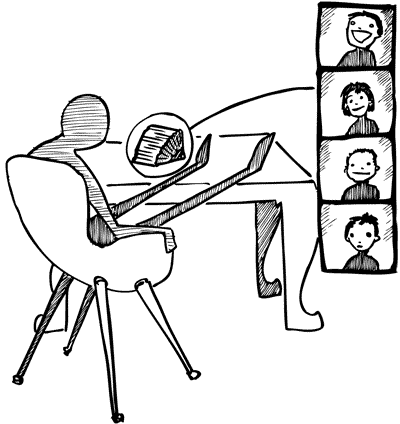Methods for improving social habits.
Keep in touch easier with practical methods. Use your time efficiently to maintain meaningful connections. You don't have to write to all people every day.
🔁 Keep in touch with people
Maintain relationships by consistently and proactively reaching out.
Keep in touch with people
Maintain relationships by consistently and proactively reaching out.
Explanation
In theory keeping in touch is simple. It's just reaching out from time to time. We meet some people automatically due to activities. But activities change and then you get out of touch. There are busy periods, where people don't have time. Afterward it's easy to forget to contact people again. Some people don't notice how much time passed and that they could reach out again. Others rely on their friends to reach out to them. They're happily responding, but aren't proactively contacting persons. People appreciate though if someone makes the effort of initiating contact. And a friendship can't work if both sides are passive. It's a good social habit to check in with everyone that matters. Good friends do this consistently and proactively.
Checklist
-
If you struggle to keep in touch, use Amicu or another tool like a calendar to remind you.
-
If you don't keep in touch at least twice a year, people eventually forget you.
-
Ask genuinely how people are, what is going in their life, and how you can help.
-
You don't need social media. Keep your contact information updated and meet or call people.
Dive deeper
👋 Reconnecting after a long time
How can you break the ice?
Reconnecting after a long time
How can you break the ice?
Explanation
It's a good idea to follow up again with old connections. But what if there's a break of months or even years? Ideally, you consistently keep in touch so this doesn't happen. But life can get busy and sometimes people lose track of each other.
Checklist
-
Don't worry or feel bad about it. This happens to everyone. Accepting this helps.
-
There's nothing wrong with reaching out again. It simply means you still care about the person and want to know what's going on in their life. But don't expect anything. Some might have forgotten you, don't want to be close anymore or are busy with other things. There's no guarantees. However, many people are happy, if someone contacts them again after time.
-
You can start with a small message. You can acknowledge the break, show that you still care and ask how the person is doing. "Hey, I know it's been a while. But I wonder what you're up to. I'd love to catch up."
-
Another thing you can consider is sending an old photo. This brings up old memories and can help to reconnect.
🤯 How to stop feeling overwhelmed
Too many people, unread texts or notifications?
How to stop feeling overwhelmed
Too many people, unread texts or notifications?
Explanation
If you always add more friends and follow more people on social networks it gets busy. If you never change the notification settings you get too many. People interrupt you with messages all day. Eventually, you lose track of where you still need to reply. People feel offended and ask why you didn't reply. You feel bad for not keeping up and it gives you a constant level of stress. This is not sustainable or healthy. But you can fix it.
Checklist
-
Disable as many notifications as possible. Mark messages as unread, if you didn't answer or note it down elsewhere.
-
If you're in a very busy period, communicate the reason and tell when you will have time again to catch up.
-
It's more efficient to batch reply one hour a day than checking messaging apps the whole day. Some people even install apps only for one hour, batch reply and then delete them.
-
Communicate boundaries and explain that you can't reply immediately.
-
Be aware of your time budget for socializing and the limits of how many people you can actively keep in touch with. Embrace those limits.
-
Mute very active group chats and instead organize group calls or meetups from time to time.
-
Focus on less frequent, but more meaningful followups. For example meeting or calling once a month instead of a few short messages in a chat everyday.
🤔 Reflecting on people
Take a break. Think about the persons in your life.
Reflecting on people
Take a break. Think about the persons in your life.
Explanation
We can reflect or think about ourselves to become aware of things. It allows us to identify problems and to find out what's good for us. Without awareness, we lack information to make solid decisions. But reflection doesn't have to be limited to ourselves. We can think about the people in our life as well. See the checklist for what questions you can ask.
Checklist
-
Are there too many or too little people in your life? The right balance changes over time for you and others.
-
Do you want to spend more time with some or less with others?
-
With whom do you want to be closer?
-
For each friendship or social relationship you can think about: What do you like and are grateful for? What would you like to change or improve? What bothers you?
Dive deeper
📅 How to schedule better
It can be tricky to schedule when to meet or call.
How to schedule better
It can be tricky to schedule when to meet or call.
Explanation
Some people have full calendars. Some prefer to be spontaneous. Friends abroad have different time zones. How do we make more use of the limited time and get to meet or call more?
Checklist
-
The great thing about habits like "every Sunday dinner with parents" or "running with a friend on Wednesday" is that it removes the scheduling. It saves time and keeping in touch is automatic.
-
Doodle.com is great for scheduling a small group event
-
Busy people can use tools like Calendly. Block some hours of social time each week and ask the people you want to meet or call to pick a convenient time for them.
-
Make it a habit to call people you can't meet due to distance during your commutes when cleaning or doing other things not needing focus. Just keep calling until you reach one that has time.
-
If you find yourself with spontaneous free time and you want to meet up send text messages to people until you find some. Many people don't ask but would love to hang out as well. "I've spontaneous time until 15:00. Do you want to go for a walk? If you already have plans ignore my message and have a great day."
⌛ How much time do you have
Know how much time you have to socialize.
How much time do you have
Know how much time you have to socialize.
Explanation
You don't have time? Every week we have the same 168 hours. The majority of that is usually spent with work and sleep already. Every person has a different schedule. But it's very important to understand that the time you have to be social is limited. For a meaningful connection like a lunch meetup or a call you need at least an hour and not 5 minutes.
Checklist
-
Write down how much time you roughly spend on everything. Just reflect on your last days and how much time you slept, worked, showered / groomed, ate food, entertainment, online browsing etc. Then write down up to 10 priorities in your life. Does it match the priorities?
-
Make another time budget. This one should be how you want to spend an average week. Split up all 168 hours. Start with easy and more constant things. For most this will be sleep, work and grooming. Keep some time for being spontaneous and also some as a buffer. How many social hours do you get?
-
If you have e.g. 25 social hours and on average meet people for 2,5 hours you can keep in touch with 10 per week. Having more reminders creates unnecessary stress as you can't do it sustainably without spending more time.
-
Many things in life like eating, sports or entertainment can be done socially. This frees up a lot of time. You can call long-distance friends during tasks that don't require much attention like your commute, washing or cleaning.
Dive deeper
⚖️ How often to keep in touch?
The frequency must fit both in a personal relationship.
How often to keep in touch?
The frequency must fit both in a personal relationship.
Explanation
The first step is to become aware of the time limitations. Then we can reflect on our own resources. But don't forget it needs to fit the other person as well. If you want to meet a friend every week, but he or she doesn't have the time it doesn't work. If you keep trying this creates a conflict. Maybe they schedule it anyway and don't get enough time for other important things. Or they feel bad for declining your invitation even though they want to meet every month. It's like a plant you need to find out how much water each needs. Too little and too much water hurts the plant. Maybe it needs more water in the summer season and less in the winter. Sometimes people don't have time to meet as they're busy. And other times they're free and more social. It depends on the person and changes over time.
Checklist
-
Consider checking in and asking how busy a person is and why. Is it a temporary or permanent reason?
-
You can always ask what they think of meeting more or less often. "Hey, I enjoy our board game session every two weeks. What do you think of doing every week or is that too much for you?"
-
If you're busy yourself communicate openly. Don't just say "I'm busy." People might think you aren't interested. Instead, say when you're freer or propose a schedule that works for you. And make it clear, if it's temporary or permanent. It makes a big difference.
-
If you or others are always too busy someone needs to rethink priorities and how much time they spend or reduce the people. This can involve keeping in touch with fewer people.








